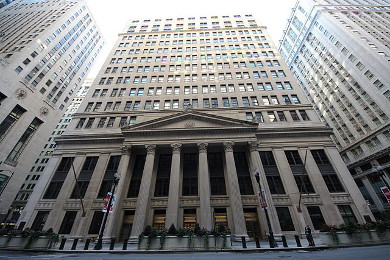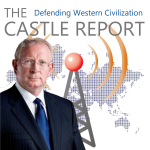Constitution
Federal Reserve gets a new boss

Hello, this is Darrell Castle with today’s Castle Report. Today is Friday, November 10, 2017, and as you may know November 10 is the Marine Corps birthday. I couldn’t let that day go by without at least saying “Happy Birthday” to my fellow Marines. I should also mention the tragic shooting at a church in Texas as the important story for the week but, despite the tragedy, today we discuss something more mundane but something of great importance, and that is President Trump’s appointment of the new Federal Reserve Chairman.
Meet the new boss of the Federal Reserve
Assuming confirmation by the Senate, and that seems like a mere formality, the new Fed Chairman will be Jerome “Jay” Powell. Mr. Powell is a graduate of Princeton University and Georgetown University Law School so he is a lawyer not an economist. He is a former investment banker with a little Treasury Department time under George H. W. Bush. He was also a partner in the Carlyle Group, which is basically a Bush Family hangout for financial wheelers and dealers, but he was appointed to the Federal Reserve Board in 2012 by Barack Obama. Since Mr. Powell’s appointment he has never cast a single vote against Janet Yellen or the Federal Reserve Board’s decisions; not one no vote in six years.
His series of votes supporting board decisions is very relevant because it makes him safe. Mr. Powell will not rock the boat, or so it appears. President Trump interviewed several people before he settled on Jay Powell but reportedly Steve Mnuchin, Secretary of the Treasury, pushed hard for Powell. One must assume that things will remain the same because if Mr. Powell has his own opinions about monetary policy, how would anyone know what they are since he has never dissented from standard policy?
Those who have known me for a while, and have listened to my pod cast on why the Fed should be abolished, know how I feel about it, but until someone like me is elected we are apparently stuck with it so we should try to understand it.
What is the Federal Reserve?
The Federal Reserve (Fed) is basically a cartel of the 12 Federal Reserve Banks and the Chairman or director of each of those banks makes up the Federal Reserve Board. The Fed board is appointed by the President, as is the chairman of the board. The opportunity to appoint directors is not as intensely examined as the opportunity to appoint Supreme Court Justices, but the board is vitally important since it determines monetary policy, i.e., interest rates, etc., for the United States.
The Federal Reserve has existed since 1914, having been formed in late December 1913, but over the last four decades it has gained tremendously in power and independence in policy making. It’s during that forty-year period, thanks in part to four strong chairmen, that the Fed has been able to operate with little or no oversight from Congress or the President. The only control seems to be the President’s appointment of the Board, although from a list he is given, and appointment of the chairman, also from a list he is given.
Those four Chairs were: Paul Volcker, who was brought in to raise interest rates and slow inflation during the Carter Presidency; Alan Greenspan, who served for almost 20 years and whose role was to keep the system running smoothly and it worked until the crises of 2007-8; Ben Bernanke, who came in to clean up the housing mess and instituted a policy of money printing known as “quantitative easing“, which still exists to some extent; and Janet Yellen. Under Bernanke and Yellen ,the Fed expanded its mandate to ensure full employment and protect the dollar to a role of financial stability.
Trump v. the Fed
During the campaign, Trump seemed to be on a collision course with the Fed since he criticized Fed policy relentlessly. He even accused the Fed of keeping interest rates low in the campaign to help Clinton. Many people, myself included, assumed that he would take action to bring policy more in line with his own but instead he went to Goldman Sachs for a Treasury Secretary, who then brought in other Goldman people, and it seems like business as usual in the financial world that revolves around the United States Government.
Trump has a chance to leave his mark on the Federal Reserve System. Members of the Board serve ten year terms and he has a chance to appoint at least three to four directors, plus the Chairman. So far, it appears that his decision is “don’t rock the boat”, and keep everyone happy by letting things just remain steady as they are.
A safe appointment?
Mr. Powell, whose appointment will be official February 1, if the Senate confirms, certainly appears to fit that bill as even his speeches support Janet Yellen’s approach, as well as his voting record. Interest rates will remain low then, although the Fed has a desperate need to raise them at least to an area like 3% over a period of one to two years. The reason is that right now, rates are at or near the bottom, so if there’s another crises, or I should say when there’s another crises, the Fed has no rabbit to pull from its hat to spur the economy.
If that doesn’t make sense, think about it like this; in 2007- 2008, the Fed took interest rates down rapidly to spur borrowing and stimulate the economy, but if rates are already at the bottom, what can it do? In order to have at least a little ammunition in its gun, the Fed will need to raise rates at least a little so it can appear to be doing something by lowering them in the next crises. It has already pumped about as much money into the system as the system can handle so we will have to wait and see what happens.
Threat of inflation
The last thing this country needs right now is high inflation so the Fed walks a very scary tightrope. Inflation has been in decline since the days of Paul Volcker, and even trillions injected into the economy have not increased it. However, inflation is still scary enough that the Fed must remain vigilant because inflation would rip our society apart. We can muddle along for decades with deflation, as we have been doing, but inflation on a runaway scale is nation-destroying. Just look at the examples of Japan, which has had deflation since the late 80’s but is very stable, and Venezuela, which has had inflation for just a relatively short time and is coming apart.
Jerome “Jay” Powell would appear to be up to the task of keeping rates relatively low, and thereby having to constantly walk the tightrope of inflation. Low rates are good for certain markets, buying and selling houses, for example, but low rates tend to kill savers. If you are at or near retirement, and depend on interest income, don’t expect a raise anytime soon because inflation control is at the expense of savers.
Trade implications
It also appears, at least to me, that there is no reason why the stock market should not continue setting records so if you think that is part of making America great again, you’re in luck. The President has said he wants to draw investment to U.S. manufacturing, reduce imports, and boost exports, and to do that he needs a weak dollar to make exports cheap and desirable. I’m sure that his new Fed chairman has assured him that he is down with that cause.
So in closing, meet the new boss, same as the old boss. Whether that is good or bad, I suppose is a matter of perspective.
At least that’s the way I see it.
Until next time folks,
This is Darrell Castle,
Darrell Castle is an attorney in Memphis, Tennessee, a former USMC Combat Officer, 2008 Vice Presidential nominee, and 2016 Presidential nominee. Darrell gives his unique analysis of current national and international events from a historical and constitutional perspective. You can subscribe to Darrell's weekly podcast at castlereport.us
-

 Civilization4 days ago
Civilization4 days agoWhy Europe Shouldn’t Be Upset at Trump’s Venezuelan Actions
-

 Christianity Today4 days ago
Christianity Today4 days agoSurprising Revival: Gen Z Men & Highly Educated Lead Return to Religion
-

 Civilization5 days ago
Civilization5 days agoThe End of Purple States and Competitive Districts
-

 Executive5 days ago
Executive5 days agoWaste of the Day: Can You Hear Me Now?
-

 Civilization2 days ago
Civilization2 days agoTariffs, the Supreme Court, and the Andrew Jackson Gambit
-

 Civilization2 days ago
Civilization2 days agoWhy Europe’s Institutional Status Quo is Now a Security Risk
-

 Civilization3 days ago
Civilization3 days agoDeporting Censorship: US Targets UK Government Ally Over Free Speech
-

 Executive2 days ago
Executive2 days agoWaste of the Day: Wire Fraud, Conflicts of Interest in Connecticut










